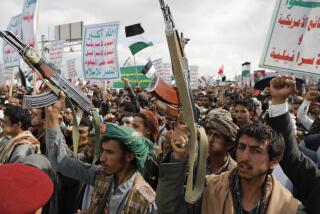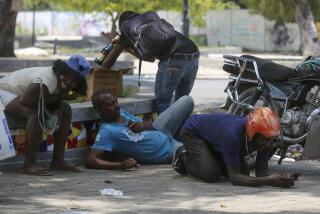Detainees in Haiti a Focus of Concern : Occupation: The U.S. refuses to release the names or crimes of those held. Human rights groups question the legality of their confinement.
PORT-AU-PRINCE, Haiti — Scores of Haitians have been arrested by American troops since the occupation of Haiti last month, and questions are being raised about the legal grounds on which the detainees continue to be held.
With no functioning government in place yet, no charges have been filed against the people arrested. The U.S. government refuses to release the detainees’ names or other details about who they are and of what they stand accused.
On Thursday, 64 people were being held in a complex of warehouses on the outskirts of Port-au-Prince, said U.S. Army Col. Barry Willey, spokesman for the military mission here. The number has fluctuated considerably, however, as some people are released and additional suspects are detained. The American military has not provided a total number of arrests and releases. Some human rights groups have expressed concerns about whether the rights of the detainees are being respected and whether the arrests would stand up in a court of law.
“We are skating on thin ice legally,” acknowledged a senior U.S. official. The official said the United Nations’ resolution that authorized the use of all means necessary to restore democratic rule to Haiti is considered justification for the detentions.
Critics say the questionable practices do little to further the cause of establishing a rule of law in Haiti and will end up alienating the falsely accused.
At least one U.S. citizen is among the people in custody, officials said.
Some of the people arrested have been clearly identified as backers of the outgoing military regime. But in some instances, arrests have been made based almost exclusively on denunciations by neighbors or townspeople and with little corroborating evidence, according to sources familiar with the cases.
In the rural port of Fort Liberte, for example, the wealthiest man in town, Nyll Calixte, was arrested along with his French-born wife by U.S. Special Forces within hours of their occupation on Oct. 5.
Calixte, a former Haitian ambassador and head of a law school, was fingered by townspeople as the principal local representative of the military regime’s armed civilian force. With the townspeople cheering, he was handcuffed, loaded in the back of a U.S. Army truck and held for hours in a dirt-floor prison until being transported to Port-au-Prince for interrogation.
One day later, Calixte was released with an apology. The U.S. military came up with a form letter for this and similar occasions; it says the bearer of the letter was arrested by mistake and “is innocent.”
Willey said arrests are based on “multiple intelligence” and that the American military is respecting Haitian, U.S. and international law. He said each person arrested is questioned in the presence of U.S. military lawyers and that the chief lawyer, or judge advocate, determines whether the person should be released or continue in custody.
“Military lawyers are present,” he said. “All sides are heard. They (the military lawyers) are doing their thing in there to see that everyone gets a fair shake.”
Families and private lawyers have been given access to the detainees only in recent days, according to human rights officials. Some of the families are still not certain of the reasons their relative is in custody.
After considerable delay, the International Committee of the Red Cross was given access this week to inspect the detention facilities, a spokeswoman for the agency said.
Willey said all detainees will be turned over to the government of President Jean-Bertrand Aristide, which will resume office with the exiled president’s return to Haiti on Saturday.
Although U.S. officials refuse to identify the detainees, another source gave the name of one man, Anthony Saieh, described as a prosperous farmer from a well-established entrepreneurial family. His 75-year-old mother, Jeanne Marie, said her son was arrested Saturday after being reported for possessing guns. She said he has licenses for the guns he owns.
“I cannot say if this is injustice or not,” she said. “We do not know what happened. We are not in politics. We do not interfere in the affairs of anybody. A family like ours cannot be involved in anything like this. So this is the way things are going in Haiti.”
More to Read
Sign up for Essential California
The most important California stories and recommendations in your inbox every morning.
You may occasionally receive promotional content from the Los Angeles Times.











